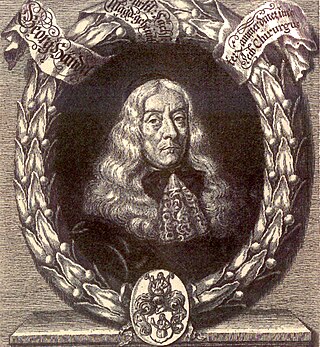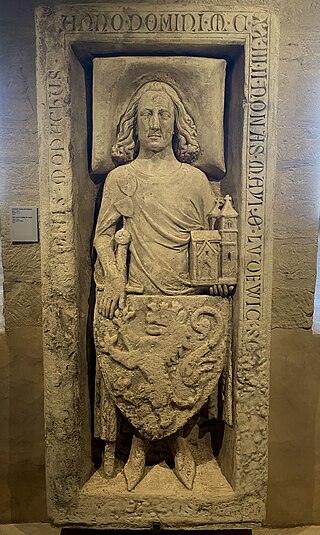
Saxony-Anhalt is a state of Germany, bordering the states of Brandenburg, Saxony, Thuringia and Lower Saxony. It covers an area of 20,451.7 square kilometres (7,896.4 sq mi) and has a population of 2.17 million inhabitants, making it the 8th-largest state in Germany by area and the 11th-largest by population. Its capital is Magdeburg and its largest city is Halle (Saale).

Halle (Saale), or simply Halle (German:[ˈhalə]; from the 15th to the 17th century: Hall in Sachsen; until the beginning of the 20th century: Halle an der Saale ; from 1965 to 1995: Halle/Saale) is the largest city of the German state of Saxony-Anhalt, the fifth most populous city in the area of former East Germany after (East) Berlin, Leipzig, Dresden and Chemnitz as well as the 31st largest city of Germany, and with around 244,000 inhabitants, it is slightly more populous than the state capital of Magdeburg. Together with Leipzig, the largest city of Saxony, Halle forms the polycentric Leipzig-Halle conurbation. Between the two cities, in Schkeuditz, lies Leipzig/Halle International Airport. The Leipzig-Halle conurbation is at the heart of the larger Central German Metropolitan Region.

The Saale, also known as the Saxon Saale and Thuringian Saale, is a river in Germany and a left-bank tributary of the Elbe. It is not to be confused with the smaller Franconian Saale, a right-bank tributary of the Main, or the Saale in Lower Saxony, a tributary of the Leine.

The Province of Saxony, also known as Prussian Saxony, was a province of the Kingdom of Prussia and later the Free State of Prussia from 1816 until 1944. Its capital was Magdeburg.

Wettin is a small town belonging to the municipality of Wettin-Löbejün in the Saale District of Saxony-Anhalt (Saxony-Ascania), Germany. It is situated on the River Saale, just north of Halle. It is known for Wettin Castle, the ancestral seat of the House of Wettin, the former ruling dynasty of Saxony, Poland, the United Kingdom, Belgium, and Bulgaria. The town and its name are of Slavic origin.

Weißenfels is the largest town of the Burgenlandkreis district, in southern Saxony-Anhalt, central Germany. It is situated on the river Saale, approximately 30 km (20 mi) south of Halle.

Giebichenstein Castle is a castle in Giebichenstein district of Halle (Saale) in Saxony-Anhalt, Germany. It is part of the Romanesque Road.

The Moritzburg is a fortified castle in Halle (Saale), Germany. The cornerstone of what would later become the residence of the Archbishops of Magdeburg was laid in 1484; the castle was built in the style of the Early Renaissance.

Georg Händel was a barber-surgeon and the father of Georg Frideric Handel.
The Handel Festival in Halle an der Saale, Saxony-Anhalt, is an international music festival concentrating on the music of George Frideric Handel in the composer's birthplace. It was founded in 1922 and it grew into a center of Handel studies and performance in Europe. Especially Handel's operas have been staged regularly, some of them as first revivals.

Transdev Sachsen-Anhalt is a regional railway company, a subsidiary of Transdev Germany. It provided passenger services on the North Harz network from 2005 to 2018 under the name HEX (HarzElbeExpress).

Louis the Springer, sometimes called Louis the Jumper or Louis the Leaper, was a German nobleman and count in Thuringia from the death of his father until his own death on 8 May 1123. Little is known about him, although he is mentioned in many legends. He was a prominent opponent of the Salian emperors Henry IV and Henry V during the Investiture Controversy.
The following is a timeline of the history of the city of Halle an der Saale, Germany.

Gerhard Lichtenfeld was a German sculptor and academic teacher, whose works were installed in public space in the Halle (Saale) and Merseburg districts, and who exhibited internationally. He was awarded the Handel Prize.

Burg Giebichenstein Kunsthochschule Halle (BURG) is the university of art and design in Halle an der Saale that was established in 1915. With a student body numbering over 1,000, BURG is one of the largest universities of art and design in Germany. It offers 20 art and design degree programmes in two faculties.
Una Helga Moehrke is a German visual artist specializing in painting, drawing, performance art and experimental text. She was a Professor for Art and Art Mediation at Burg Giebichenstein University of Art and Design in Halle from 1994 to 2018.
Konstanze Musketa is a German musicologist and head of the Library of the Handel House Foundation.
Edwin Werner is a German musicologist and Handel scholar.

The Philharmonische Staatsorchester Halle was a symphony orchestra in Halle that existed from 1946 to 2006, which functioned as a concert orchestra and was last predominantly supported by the Land of Saxony-Anhalt. As a result of the fusion with the Orchester des Opernhauses Halle, the Orchestra was merged into the Staatskapelle Halle in 2006.

















